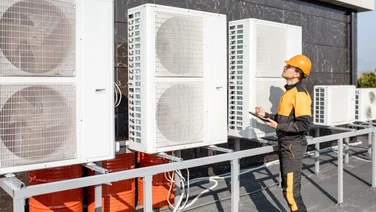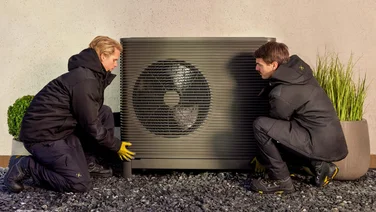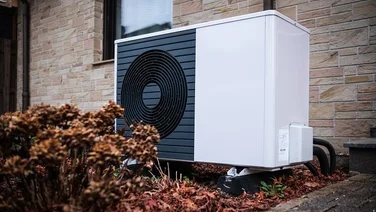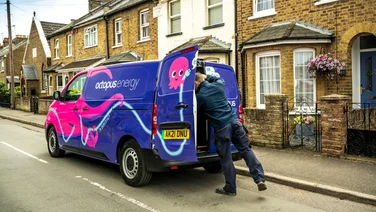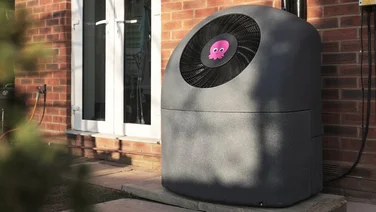- Heat pumps are designed to cut carbon emissions down by a substantial amount
- The average heat pump cost varies between £7,000 to more than £30,000
- Heat pumps are between 300% and 600% more efficient than gas boilers

Heat pumps are absolutely worth it in the UK thanks to the huge carbon emission savings they offer and the fantastic support that the Boiler Upgrade Scheme can provide.
Designed to slash your carbon emissions, and with the gas boiler ban still officially in place for 2035, they will soon be one of the only ways to heat your homes effectively. They won’t necessarily save money right now, but when electricity becomes cheaper than gas, it absolutely will be.
They can extract heat from the air, ground, or body of water, operate so quietly you’ll barely hear them, and fit nearly outside your home instead of taking room inside. The average heat pump cost varies between £7,000 to more than £30,000, but many can take advantage of the Boiler Upgrade Scheme that will shed £7,500 off the final price.
Most recently, Ofgem updated its guidance, meaning more will now qualify for the scheme. It now means that homeowners will no longer be required to install cavity wall or loft insulation to qualify for the scheme, which could save consumers up to £2,500 on the upfront installation costs.
If you’re still not convinced that a heat pump is worth it, we dive into more detail in this guide. We’ll discuss the benefits, available schemes, and our final verdict on whether heat pumps are worth it.
Want to skip the reading? You can fill in this form to compare the best heat pumps on the market. We’ll pass your details to our expert suppliers, who’ll send you free quotes to compare.

Get free heat pump quotes
Answer a few quick questions, and our trusted installers will send you bespoke heat pump quotes – for free.

Reasons why you should buy a heat pump
Heat pumps offer significant environmental and efficiency advantages, especially as the UK evolves toward sustainable living and energy policies. In the future, they are likely to offer financial benefits as well due to their immense efficiency levels.
Here are the main benefits:
- Significant carbon emissions savings:
Installing a heat pump can reduce a household’s carbon footprint considerably:
- Replacing a gas boiler saves at least 1.9 tonnes of CO₂ per year.
- Replacing an oil boiler saves around 2.9 tonnes of CO₂ per year.
- Even switching from electric storage heaters saves 1.6 tonnes of CO₂ per year.
Nationally, if all UK households installed heat pumps, the country’s total carbon emissions would drop by 16%, significantly aiding climate goals.
Chris, an Octopus Energy customer, said: “We need to move away from burning fossil fuels due to the damage they cause. In the future, we’ll look back at this phase of destroying out planet and realise how crazy it was. It’s time to make a change, and the heat pump is a step in the right direction.”
- Cost Savings Over the Lifetime of the System:
- An air-source heat pump typically saves homeowners around £290 per year compared to a traditional gas boiler, or £1,200 per year if you have old electric storage heaters. For other heating types, see the graphic included below.
- Although initial installation costs are higher, the Boiler Upgrade Scheme provides £7,500 in grants, substantially lowering upfront expenses.
| Existing System | Annual Savings (£) |
|---|---|
| Old (G-rated) gas boiler | 290 |
| New (A-rated) gas boiler | -3 |
| Old electric storage heaters | 1,200 |
| New electric storage heaters | 700 |
| Old (G-rated) oil boiler | 280 |
| New (A-rated) oil boiler | -55 |
| Old (G-rated) LPG boiler | 650 |
| New (A-rated) LPG boiler | 260 |
| Coal | 650 |
Typical savings a heat pump can make compared to other heating types in England and Wales. Prices based on 24.5 p/kWh and a gas price of 6.29 p/kWh. Data courtesy of the Energy Saving Trust.
- Improved efficiency compared to traditional heating:
- Heat pumps have efficiencies ranging from 300% to 600%, far surpassing gas boilers, which generally peak at around 90% efficiency.
- This means heat pumps deliver much more energy in heat output compared to the electricity they consume.
- This also means that over time they will prove cost-effective.
- Stay ahead of the upcoming gas boiler ban:
- Although political uncertainty exists regarding enforcement, installing a heat pump ensures you’re prepared for future policy changes, avoiding potential disruptions and price surges.
- Manufacturers are gradually shifting away from gas boiler production due to decreasing market demand, making heat pumps an increasingly sensible long-term choice.
- Efficiency benefits by type of heat pump:
- Air-source heat pumps:
- These are the most common type, relatively affordable and easy to install.
- Typically 300% efficient, reducing heating bills significantly.
- Lifespan of around 20 years, twice as long as traditional boilers.
- Water-source heat pumps:
- Highest efficiency among types, approximately 450% efficiency, making them 1.5 times more efficient than air or ground source heat pumps.
- Ideal for homes near suitable water bodies, potentially offering even greater energy savings.
- Ground-source heat pumps:
- Provide the most consistent, year-round heating performance.
- Substantially reduce carbon emissions and energy consumption, ideal for large or rural properties.
- High upfront costs, offset by exceptional long-term efficiency and operational savings.
- Air-source heat pumps:
- Financial support via the Boiler Upgrade Scheme (BUS):
- Offers £7,500 grants toward installation, drastically reducing upfront costs.
- Installer-led application process reduces homeowner workload.
- Currently available until 31 March 2028, supporting a smooth financial transition to renewable heating.
Am I eligible for the Boiler Upgrade Scheme?
To be eligible, you must meet the following requirements:
- You must own the property you’re applying for, including if it’s a business, a second home, or a property you rent out to tenants
- You must be replacing fossil fuel heating systems, such as oil, gas, electric or LPG
- You must have a valid EPC certificate
You can get the BUS grant for a biomass boiler if you meet all these requirements:
- Your property is off the gas grid
- Your property is in a rural location
- Your boiler has an emissions certificate showing that polluting emissions are kept to a minimum
- The BUS is not available to properties that have already received public funding for a heat pump or biomass boiler in the past, through schemes like the Energy Company Obligation scheme.
Properties considered social housing under the Housing and Regeneration Act 2008 are also not eligible. New builds are also not eligible unless completed with a fossil-fuel boiler.
If your property is a custom-built home, it won’t need an EPC to qualify, as you will have had to follow the latest eco-friendly building regulations to complete it. You will also need to be the person who built the home to apply, and a business must have never owned it.

Get free heat pump quotes
Answer a few quick questions, and our trusted installers will send you bespoke heat pump quotes – for free.
How popular is the Boiler Upgrade Scheme?
According to the Boiler Upgrade Scheme (BUS), a total of 72,263 applications for vouchers were received by the end of February 2025. Ninety-seven percent of these grants were allocated towards air source heat pump installations. BUS statistics show that September 2024 was the scheme’s busiest month, with over 3,200 applications alone. In total, 96% of applications have been for air-source heat pumps.
To this end, the UK Government has recently increased the budget for the BUS until March 2025 to include an extra £25 million in funding. This additional funding is on top of the extra £30 million announced in November 2024.
This additional funding has allowed Ofgem (the UK’s primary energy regulator) to over-allocate up to £280 million vouchers. This extra funding will ensure that people can still access the scheme.
These changes follow the improvements announced in the Warm Homes Plan in late 2024. This will increase BUS funding to £295 million for 2025/26.
Other changes include removing planning barriers for households in England to install an air source heat pump. This includes removing the rule that said heat pumps had to be installed more than one metre away from a property’s boundary.

Do you need building regulations and planning permission?
Most homeowners no longer need to worry about getting planning permission to install a heat pump, and some suppliers will cover this in the assessment reports before installing one.
For example, Evergreen Energy includes this as part of its Home Assessment Report, checking that everything is good to proceed.
But this will be dependent on your region.
In Scotland, for example, an air source heat pump’s external unit and housing can’t exceed 3 metres in height, but in England, it can’t be more than 0.6 m3. If it does, you might need permission to install it.
Overall, as long as it meets the requirements set out within your region, you won’t need to apply for planning permission.
Is the gas boiler ban still going ahead?
The Boiler Upgrade Scheme was created with the gas boiler phaseout in mind and the related target to install 600,000 heat pumps in homes each year by 2028. As it stands, gas boilers will be banned from 2035, but it is widely believed that the government will rip up this idea for existing homes.,
In June Labour vowed to scrap this in favour of financial incentives to install low-carbon technologies, like heat pumps.
Ed Miliband said at the time: “On home heating – as we said in our manifesto – no-one’s going to be forced to rip out their boiler. We’re absolutely clear about that.
“We haven’t stuck with the government’s 2035 target when you can’t replace your gas boiler. We’ve got to show that heat pumps are affordable and are going to work for people.”
As time passes, however, companies will inevitably become less enthusiastic about manufacturing new gas boilers for a dwindling customer base, resulting in declining standards across the industry.
If you want to speed up the process of finding your perfect heat pump, use our form, and our experts will be in touch with their best prices.
Summary – Are heat pumps worth it?
Yes, absolutely, air source heat pumps are worth the investment, especially following the introduction of the Boiler Upgrade Scheme. The prospect of saving tonnes of CO2 over the next two decades would be attractive, but the sizable heating cost savings are a big selling point.
It’s even more appealing when you consider this grant and the upcoming phaseout of gas boilers in new homes, which will likely be followed by further restrictions to ensure the UK reaches its net-zero carbon emissions goals.
Other than that, the main takeaways regarding the utility of heat pumps include, but are not limited to:
Choosing a heat pump is an investment in long-term energy efficiency, environmental responsibility, and peace of mind.
- Heat pumps can significantly reduce your home’s carbon emissions, helping you meet future sustainability targets.
- Heat pumps far outperform traditional gas boilers with efficiencies ranging from 300% to 600%.
- Installing a heat pump prepares your home for the UK’s planned gas boiler ban in 2035.
- The Boiler Upgrade Scheme offers grants of £7,500, significantly cutting upfront installation costs.
- Recent Ofgem updates mean more homeowners qualify without needing expensive insulation upgrades.



